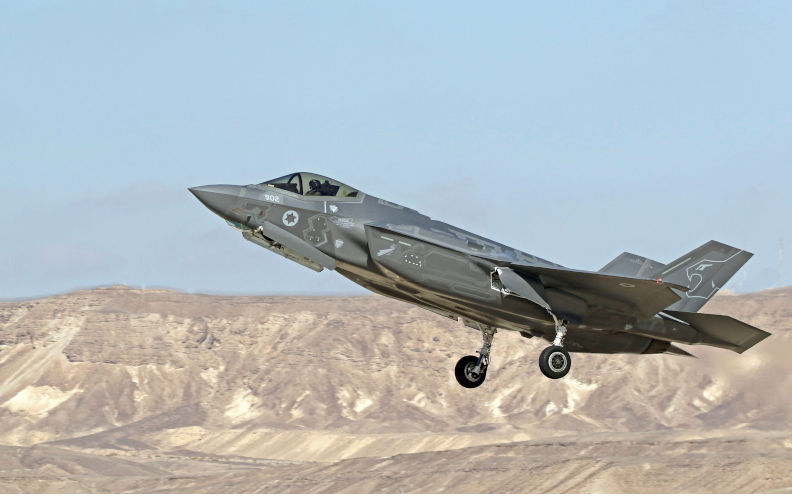Australia’s role in the F-35 supply chain – what a tangled web we weave!
October 27, 2025
The government’s ducking and weaving about military exports to Israel went up a whole new notch this month, arguing in _Senate estimates_ that just because something was shipped from Australia, doesn’t mean it was exported from Australia.
For more than two years, the Albanese Government has been desperate to distance Australian manufacturing from Israel’s relentless genocide in Gaza. And so they should. A YouGov poll released this month demonstrates that a sizeable majority of the public want Australia to stop arms trade with Israel. Many Australians have been absolutely sickened to watch the most gross human rights violations unfold in real time on our screens, and want to ensure there is nothing in our actions or omissions that are supporting these crimes.
Ministers have repeated ad nauseam the statement “Australia has not supplied weapons or ammunition to Israel since October 2023 and not for at least the last five years” and characterised as misinformation claims to the contrary. And given that the government has chosen this exact frame of words repeatedly, perhaps this statement is strictly true, if it was to be tested in a court of law.
But the statement obviously fails the pub test as scores of government and private company media releases celebrate military partnerships with Israel, Australia retains a trade and Defence office in Israeli Occupied Jerusalem and there is abundant information on the public record about Australian-made material in Israel. The most blatant example was when a photo surfaced of Israeli defence officials proudly standing with an Australian-designed and built remote weapon system in January. In that case, it appears that the Australian company made all the parts in Australia, but sent them to the US to be assembled and exported to Israel from there – failing the pub test spectacularly.
The government arguments rejecting its involvement become convoluted when considering the F-35 supply chain. Australia is part of a consortium of countries that make parts for the F-35 stealth fighter planes, often the sole manufacturer of a particular part. Australia is one of the countries that purchase the completed planes. Israel is another – often supplied to them as military aid by the US. F-35s have been used in Israel’s genocide in Gaza. In both the UK and the Netherlands, there have been legal challenges to stop exports of F-35 parts, and in the Netherlands that has led to an end of direct exports to Israel.
In Senate estimates earlier this month, a Labor Senator asked a range of questions to “clarify” the revelation published by _P&I_, that at least 68 shipments of F-35 parts had gone from Australia to Israel on passenger aircraft. Greens Senator David Shoebridge continued the questions. The discussion takes quite a bit of mental gymnastics to follow, but the following is part of the answer from a Defence official:
The components that are part of that global supply chain solution are owned by the US Government, and, as I said, administered by Lockheed Martin on their behalf. An item that comes out of regional warehouses — we have a regional warehouse in Williamtown — is then vested to Australia and placed on the aircraft. An item removed from that goes back into that warehouse, and that immediately becomes a US Government asset –again, administered by Lockheed Martin on their behalf. That global supply chain works across the globe to try and provide the most cost-effective sustainment solution for the Joint Strike Fighter Program.
This appears to mean that while Australian companies proudly make the parts, we then “supply” them to the US while they remain on Australian soil (at Williamstown warehouse). The parts are then sent from Australian soil to Israel, but considered an export from the US, rather than Australia. Hey presto, hands washed – Australia never exported anything to Israel!
Modern military supply chains are indeed complex, but that never excuses a country (or indeed a company) from their human rights obligations. The Arms Trade Treaty is crystal clear – countries are responsible to not transfer weapons or components if they think they could be used to commit human rights abuses. That’s why Quakers have been leading a call for a review of all military trade infrastructure (now signed by 61 organisations) so that Australia can review systems to both respond to the increased complexity, while at least aspiring to global benchmarks of transparency and accountability.
It is clear that Australian manufacturing is boosting Israel’s military capacity. Let’s acknowledge that and stop playing word games. It is beneath us all and undermines what Australians expect as basic honesty and decency. Australian systems need to be reviewed to safeguard our exports so that — regardless of what the supply chains look like — Australian-made products are never supporting human rights violations anywhere.
The views expressed in this article may or may not reflect those of Pearls and Irritations.

